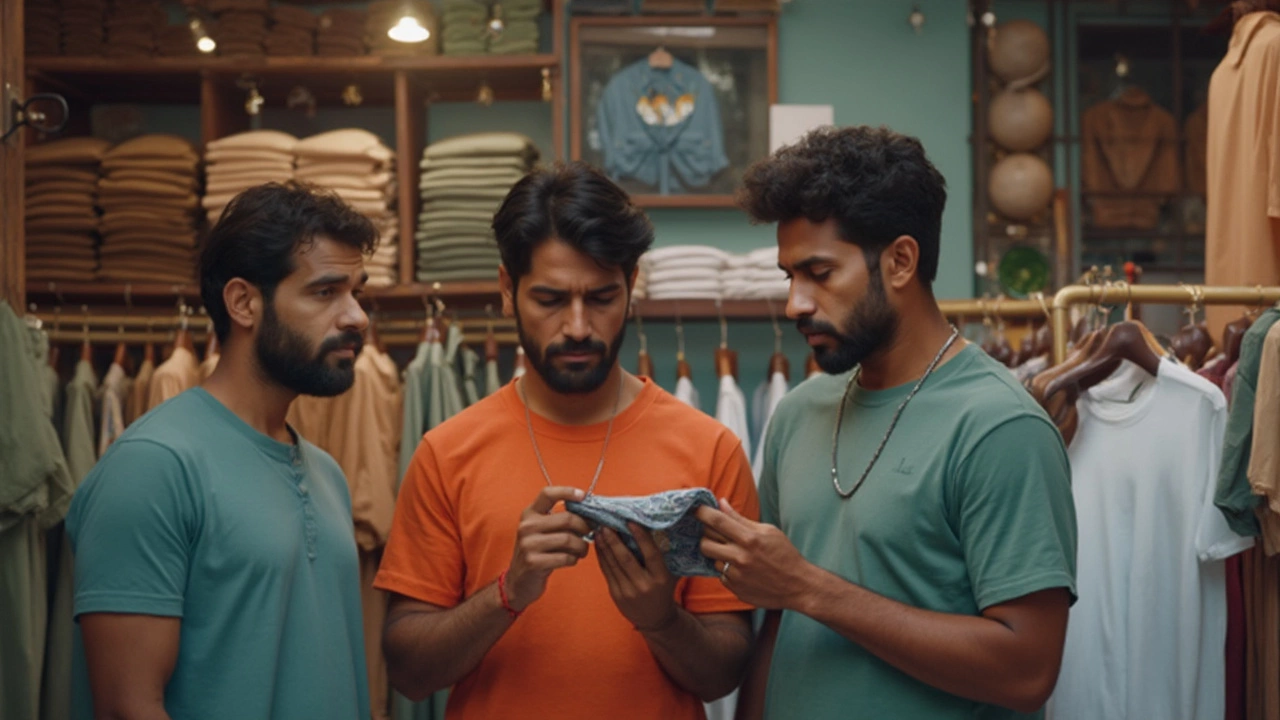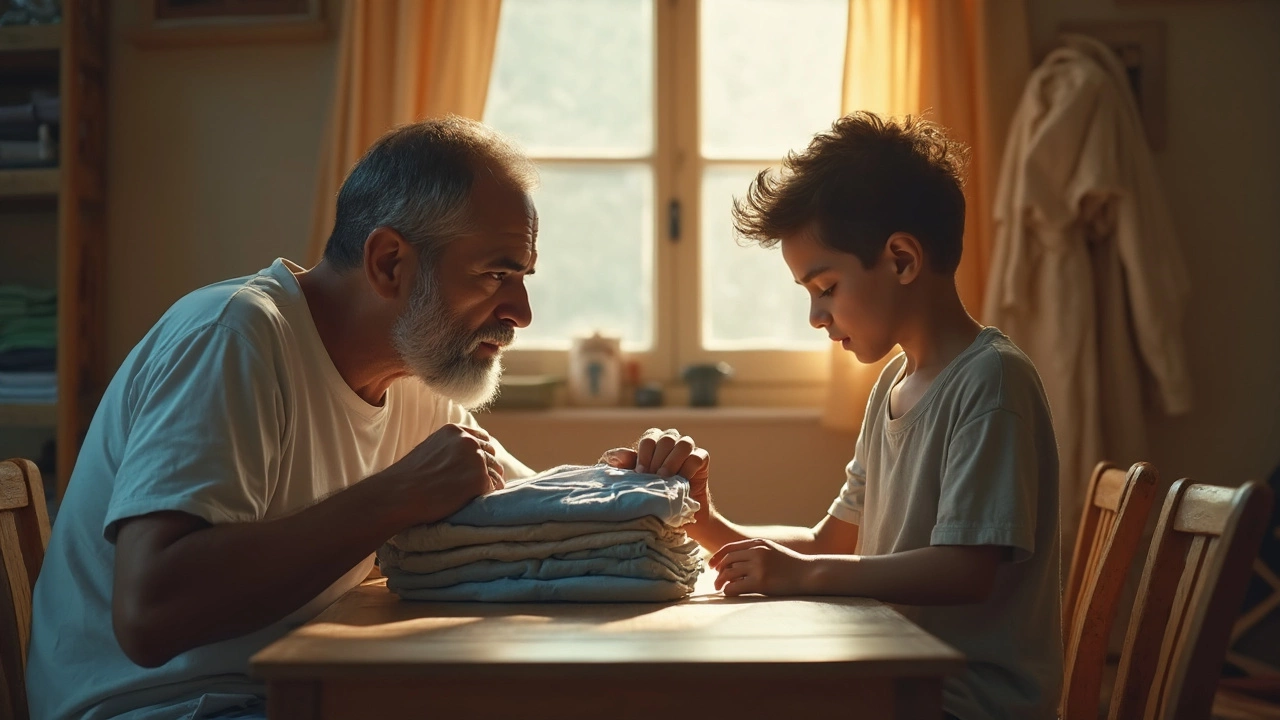Best Quality Men's Shirts: Who Really Delivers Top T-Shirts?

If you’ve ever bought a so-called “premium” men’s t-shirt that shrunk, stretched, or faded after two washes, you know the frustration. Not all t-shirts are made the same, and price doesn’t always mean quality. Some shirts feel great in the store but turn into pajamas after laundry day. Others somehow look brand new for years.
Most guys just want three things: a shirt that fits well, holds up over time, and doesn’t feel scratchy. Sounds simple, but cheap fabrics and lazy stitching ruin plenty of options out there. There are proven ways to spot what’s worth your money—long-staple cotton, tight stitching, and a neckline that keeps its shape are dead giveaways. And yes, the brand you pick makes a difference, but the real secret? The material and construction matter most.
- What Makes a T-Shirt High Quality?
- Game-Changing Brands for Men’s Shirts
- Spotting Cheap vs. Premium Shirts
- Material Breakdown: Cotton, Blends, and More
- Smart Shopping Tips for Your Next Buy
What Makes a T-Shirt High Quality?
For most guys, the difference between a drawer filler and a go-to favorite shirt comes down to three things: fabric, construction, and fit. Knowing what to check helps you skip the duds and go straight for the shirts you’ll want to wear every week.
High-quality shirts usually start with long-staple cotton, like Pima or Supima. These fibers are smoother, softer, and way more durable than the short, cheap stuff you find in bargain bins. You’ll also see modal and bamboo blends in high-end shirts—they add stretch and an extra soft feel, and they don’t trap sweat as easily.
- men's t-shirts made from 100% Pima or Supima cotton hold their shape and color far longer.
- Look for tightly knit fabric. If you hold it up to the light and can see right through it, it’s probably going to sag or get holes before you know it.
- Check the stitching along the seams. Double stitching or flatlock seams mean fewer blowouts and less twisting after a few washes.
- Good shirts keep their necklines firm—even after plenty of laundry cycles. If you notice cheap ribbing, expect bacon neck after a month.
Here’s a quick stat breakdown so you can spot the real deal when you’re shopping:
| Feature | Cheap T-Shirt | Quality T-Shirt |
|---|---|---|
| Cotton Type | Short staple, generic | Pima/Supima, organic cotton, modal blends |
| Fabric Weight (gsm) | 120-140 | 150-200 |
| Stitch Count (per inch) | 6-8 | 10-14 |
| Expected Lifespan (wears) | 20-40 | 80-150+ |
When you’re holding a shirt, quick tip: stretch a small piece of fabric and let go. High quality fabric snaps right back, while the cheap stuff just sags. It’s tiny details like these that decide whether a t-shirt spends its life in your weekly rotation or just barely survives as sleepwear.
Game-Changing Brands for Men’s Shirts
Finding the brands that actually deliver on quality can save you a lot of hassle—and cash. Let’s talk about the best in the business for men’s t-shirts, with facts that cut through the hype.
Hands down, men's t-shirts from brands like Uniqlo, Everlane, and Buck Mason get called out by everyday guys and fashion reviewers all the time. Not because they spend big on ads, but because their shirts survive real-world wear and repeat washing without falling apart.
- Uniqlo: Known for their low prices and top-notch fabric tech. Their Supima Cotton T-shirts get tons of love because the cotton fibers are super long, making the shirts smooth, soft, and hard to wrinkle. A 2024 survey by GQ listed Uniqlo as the top value-for-money brand for basics worldwide.
- Buck Mason: If you want shirts that keep their shape and color, these guys nail it. Their pima cotton t-shirts are sewn in the USA, and you can feel the heft—most of their tees weigh about 150 grams, compared to the average fast-fashion tee at just 100 grams.
- Everlane: Transparency is their calling card. They break down what you’re paying for. Everlane t-shirts use certified organic cotton and score high in ethical production ratings. Their classic crew tees were rated "Best for Everyday" in Wirecutter’s round-up last year.
- Sunspel: British-made, luxury level, and around since 1860. These aren’t cheap, but the fine jersey cotton and meticulous stitching make a difference. If you want "the best t-shirt I’ve ever owned"—this is a frequent review tagline.
- Vuori and Rhone: Got an active lifestyle? These brands blend technical fabrics (like TENCEL or performance polyester) into super comfy shirts that can handle gym sweat and streetwear style. Rhone’s Reign line even uses silver thread for odor control.
Check out this quick comparison of popular brands, based on price, fabric, and durability:
| Brand | Main Fabric | Average Price (USD) | Durability Rating |
|---|---|---|---|
| Uniqlo | Supima Cotton | $15 | 4.5/5 |
| Everlane | Organic Cotton | $30 | 4.7/5 |
| Sunspel | Long Staple Cotton | $90 | 5/5 |
| Buck Mason | Pima Cotton | $40 | 4.8/5 |
| Rhone | Performance Blend | $54 | 4.6/5 |
When you compare them, it’s clear: Some brands go all-in on fabric and stitching, making them totally worth the money, while others offer solid basics you can stock up by the stack. If quality matters, you just can’t go wrong with any from this list.

Spotting Cheap vs. Premium Shirts
Grabbing a shirt off the rack is easy, but telling if it’s truly premium takes a little know-how. Most store-bought t-shirts that go for under $10 are made quick and cheap—think thin fabric, sloppy hems, and seams that twist after one wash. Sure, they look fine in pictures, but the difference is clear the minute you start wearing and washing them.
Start by feeling the fabric. Premium shirts use long-staple cotton like Pima or Supima, which feels softer and doesn’t pill as fast. If the label just says “100% cotton” with no more info, you’re probably looking at basic short-staple cotton that wears down quick. Don’t fall for heavy weight alone, either—some low-end brands make shirts thick to give a fake sense of quality, but the knit is still loose, so the shirt sags and loses shape fast.
- Pick up the shirt and hold it up to the light. If you see your hand through it, the fabric is probably too thin and won’t last long.
- Look closely at the stitching, especially along the hem and shoulders. Small, tight stitches (usually 10-12 per inch) mean more durability. Loose or uneven threads are a red flag.
- The collar should bounce back if you gently pull. Floppy necklines signal cheap construction and stretch out quickly.
- Inside, check for taped seams at the shoulder and neck. This stops chafing and helps the t-shirt keep its shape.
Here’s a quick reference comparing typical features:
| Cheap T-Shirts | Premium T-Shirts | |
|---|---|---|
| Material | Standard cotton, polyester blends | Pima/Supima cotton, Tencel, organic blends |
| Stitching | Loose, wide, may have threads sticking out | Small, even, tight stitching |
| Fit Retention | Collar and body lose shape quickly | Good structure, holds fit after many washes |
| Price | Usually under $15 | $25 and above |
Respected menswear expert Derek Guy summed it up perfectly:
“When it comes to basics like tees, it’s not just about what you buy, but how it’s made. Construction details you barely notice are what set premium shirts apart.”
If you want the best quality men's shirts, learn to spot these dead giveaways. Once you do, you’ll never waste cash on a flimsy tee again.
Material Breakdown: Cotton, Blends, and More
Let’s be real—fabric choice can make or break a men’s t-shirt. The material decides how your shirt feels, how long it lasts, and even how bad it clings when it’s humid out. Here’s what actually matters when you check those tags.
First, cotton. Not all cotton is equal. You want long-staple (or “combed” or “ringspun”) cotton: it’s smoother, tougher, and way less likely to pill. Those cheap shirts at random chain stores usually use basic carded cotton, which feels rough after a few washes. Pima and Supima cotton are the gold standard—grown mostly in the U.S., they cost more but tend to outlive and out-soft regular cotton shirts by a long shot.
Organic cotton is popping up everywhere. The draw is fewer pesticides, good for the planet and your skin. But the feel and durability come down to how it’s spun, not just the “organic” label alone.
Blends—like cotton-polyester or cotton-modal—are all about trade-offs. Blends dry faster, wrinkle less, and sometimes keep their shape better. If you sweat a ton, try shirts with moisture-wicking polyester, but don’t expect the breathability of straight cotton. Modal, made from beech trees, is buttery-soft and stretches well without looking sloppy. Bamboo blends are getting more common too—they resist odor naturally and are breathable, but actual “bamboo” shirts are mostly rayon, thanks to heavy processing.
- 100% cotton: Classic feel, great breathability, can shrink if not pre-shrunk.
- Cotton-polyester: Less wrinkles, holds shape, can feel a bit plasticky.
- Pima/Supima cotton: Silky, strong fibers, lasts years.
- Modal and TENCEL: Ultra-soft, cool to touch, doesn’t fuzz up as fast.
- Tri-blends (cotton, polyester, rayon): Stretchy, soft, vintage look.
| Material | Main Benefit | Main Drawback |
|---|---|---|
| Pima/Supima Cotton | Highest durability, smoothest feel | Pricey |
| Cotton-Polyester | Resists wrinkles, dries quick | Can trap heat, less breathable |
| Organic Cotton | Eco-friendly, gentle on skin | Shrinks if not pre-shrunk |
| Modal/TENCEL | Silky, cool, flexible | Can lose shape if stretched hard |
| Bamboo Rayon | Soft, manages odor | Not 100% eco despite label |
The biggest tip? For men's t-shirts that really last, look for specifics, not just flashy “premium” tags. If a shirt doesn’t list the type of cotton or the exact blend, that’s a red flag. You deserve to know what you’re getting.

Smart Shopping Tips for Your Next Buy
Picking out the right men’s t-shirt doesn’t have to be a guessing game. A few quick checks can save you from dumping money on mediocre shirts that disappoint. Here’s how to shop smarter and end up with t-shirts you’ll actually want to wear (not just for sleeping in).
- Check the Label, Not Just the Logo. Look for 100% cotton, pima cotton, or organic cotton for softness and breathability. If you sweat a lot or love stretch, try cotton blends with a bit of elastane or polyester.
- Touch Test. Hold the shirt up to the light and rub it between your fingers. Thin, see-through fabric means it probably won’t last. Quality tees feel a little heavier and smooth, never stiff or scratchy.
- Inspect the Stitching. Flip the shirt inside out. Tight, even stitches—especially around the sleeves and neckline—mean fewer chances of unraveling. Loose threads and uneven seams are red flags.
- Fit Over Hype. A "trendy" brand is useless if the shirt hangs weird. Try on a size or two if you’re in-store. Online, check size charts and look for brands with honest fit reviews (Everlane and Uniqlo are both straightforward).
- Shop Off-Season or Watch for Deals. Basic colors go on sale all the time. Build a "test batch" from discounted classics and upgrade as you figure out what you like.
Brands can brag about premium, but sometimes you need receipts. Here’s how three popular options stack up by real-world numbers:
| Brand | Avg. Price (USD) | Material | Machine Wash Shrinkage* | Avg. Lifespan (months) |
|---|---|---|---|---|
| Uniqlo Supima | $15 | Supima Cotton | Minimal | 18-24 |
| Everlane Premium Weight | $30 | 100% Cotton | Low | 24-36 |
| Hanes Beefy-T | $10 | Ring-spun Cotton | Some | 12-18 |
*Based on typical customer feedback in 2024 reviews.
One last tip: Good shirts might cost a few bucks more, but you won’t keep cycling through bad ones. Focus on the men's t-shirts that check all your boxes—fit, material, stitching, and price. Your closet (and wallet) will thank you.
- Jun, 12 2025
- Violet Greenfield
- 0
- Permalink
Written by Violet Greenfield
View all posts by: Violet Greenfield